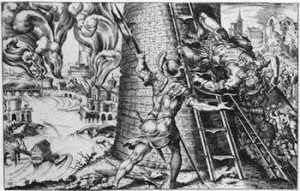 During the long sixteenth century a media revolution took place that offered unprecedented possibilities to adopt, express and exchange ideas and opinions, often of a religious nature. Many studies have revealed the importance of media such as script, print, images, theatre, songs, ritual, preaching, rumours, etc. Yet, media, an aspect of early modern communication we fail to grasp due to the institutionalisation of academic disciplines, never function in isolation. A real understanding of how different media interacted and functioned in specific settings is therefore still lacking.
During the long sixteenth century a media revolution took place that offered unprecedented possibilities to adopt, express and exchange ideas and opinions, often of a religious nature. Many studies have revealed the importance of media such as script, print, images, theatre, songs, ritual, preaching, rumours, etc. Yet, media, an aspect of early modern communication we fail to grasp due to the institutionalisation of academic disciplines, never function in isolation. A real understanding of how different media interacted and functioned in specific settings is therefore still lacking.
In this workshop, we propose to look at the phenomenon of multimediality during the long sixteenth century by focusing on the micro-level of specific multimedia events (or series of events) that took place in an urban setting, such as civic festivals, religious ceremonies, public sermons, urban revolts, executions of heretics and book burnings. The multimedial character may consist of:
- The combination of different media (oral, scripted and printed announcements) to mobilize people before the event
- The combination of different media (theatre, songs, preaching, ritual, etc.) to express religious ideas during the event
- The combination of different media (printed, handwritten and illustrated pamphlets, book volumes, chronicles, letters, rumours, etc.) after the event to publicize, comment upon and evaluate or rather to prevent further publicity (e.g. official ordinances, the Index).
In many cases this dialectic process of action and reaction occasioned broad public discussion and could even result in a ‘media hype’. This workshop’s presupposition is that the combination and interaction of various media, i.e. multimedia practices, were not only responsible for the wide and varied dissemination of opinions and ideas, but also had an impact on how these opinions and ideas were interpreted by various media consumers and thus shaped new communities of interpretation.
We invite proposals of about 500 words on a specific religiously inspired multimedia event or series of events that reflect upon one or more of the following questions:
- How did different media interact: what were the dynamics between different media, e.g. transpositions from performance to script or print or vice versa?
- Which media producers were involved, e.g. individuals such as street singers, poets, playwrights, preachers, collective bodies such as confraternities and guilds, but also secular and religious authorities?
- What was the role of urban public space, e.g. market places, streets, city halls, churches?
- What was the nature of the messages transmitted, e.g. inclusive or exclusive, atoning or polemical?
- What do these multimedia events teach us about the consumption and reception of ideas, both in a social and in a cultural sense?
- How did the combination of different media affect the perception/reception of and reaction to the events in the context in which they were used?
- What media transformations took place during the long sixteenth century: was there a rise or decline of specific media and, more specifically, of clusters of multimedia?
The number of papers foreseen for this two-day meeting is approximately twenty. The deadline for submitting proposals is November 1, 2016.
Travel and subsistence expenses will (under certain conditions) be reimbursed to participants who are members of COST Action 1301 or who are based in countries participating in this COST Action.
Organizing committee: Samuel Mareel, Bart Ramakers, Anne-Laure Van Bruaene, Louise Vermeersch
WG2 coordination: Elise Boillet, Lucie Dolezalova, Ian Johnson, Géraldine Veysseyre
Proposals are to be sent jointly to: louise.vermeersch@ugent.be and elise.boillet@univ-tours.fr.
COST Action 1301 – New Communities of Interpretation: Contexts, Strategies and Processes of Religious Transformation in Late Medieval and Early Modern Europe

Leave a Reply
You must be logged in to post a comment.